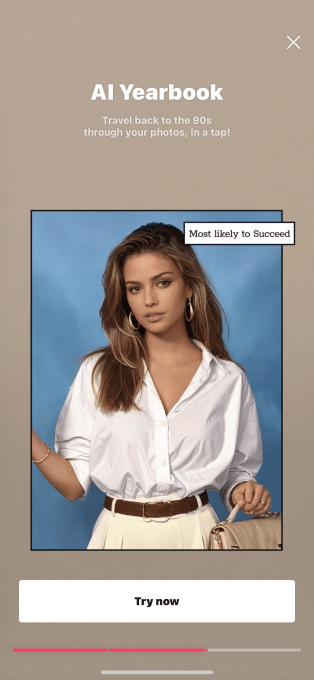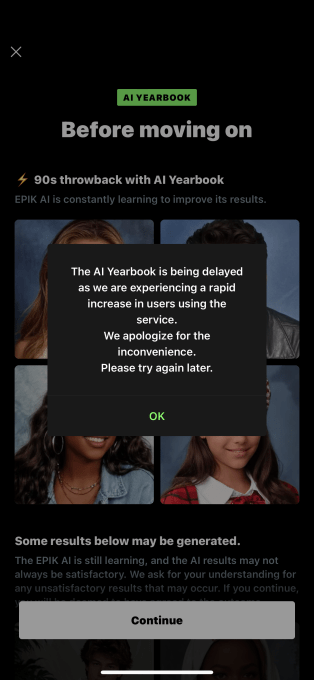[ad_1]
Another week, another AI app going viral. This time around, the AI app that has surged to the top of the App Store is EPIK, a photo-editing app that lets users generate nostalgic, 90s-inspired “yearbook” photos of themselves as one of its many templates. Similar to other recently popular AI apps, EPIK works by having users first upload a series of selfies which EPIK then uses to generate the throwback yearbook photos featuring the user in different poses, with different looks and hairstyles.
The app hails from South Korea-based Snow Corporation, a Naver subsidiary, which also makes the AI profile app Snow. In recent weeks, EPIK has gained traction on the App Store as influencers from around the world began sharing their AI-generated photos across social media.
On the U.S. App Store, EPIK is now No. 1, though it’s not quite as popular on Google Play at No. 37.

Image Credits: EPIK
According to data from market intelligence firm Apptopia, EPIK has seen a total of 92.3 million lifetime installs since its August 2021 debut, including 4.7 million downloads in the U.S. However, the app started to gain traction on September 19 and then popped even more 10 days later, the firm says.
Currently, EPIK’s largest market is India, by downloads, and the U.S. is No. 6.
Another firm, data.ai, sees slightly lower lifetime downloads at 82 million and notes the app has generated close to $7 million in consumer spending on iOS. This is the first time it’s ever ranked in Top Overall apps in the U.S., data.ai also notes.
Snow Corp. did not return a request for comment to verify these figures.
Scrolling the #epik hashtag on Instagram reveals a number of larger accounts have been joining in the trend of posting their AI yearbook photos, including beauty influencers like Samantha Batallanos (254,000 followers) and Bretman Rock (18.8 million followers), actor and rapper Tim Chantarangsu (1.5 million followers), fashion model Eva Mikulski (481,000 followers), video creators like Denyzee (526,000 followers), Missou (507,000 followers), Romy (1.5 million followers), Liz Rangel (1.5 million followers) and Hila Klein (1 million followers), Twitch streamer Pokimane (6 million followers) and many others — including influencers from the app’s home country and elsewhere in the world.

Image Credits: Pokimane on Instagram
To use EPIK’s Yearbook feature, users upload eight-12 selfie images which are then used to create the AI photos.
The app warns users that EPIK’s AI is constantly learning to improve its results and not all the AI results will be “satisfactory.” If you continue, it says, “you will be deemed to have agreed to the outcome,” the message states.
The app also suggests that users submit clear photos with a diverse range of expressions, angles and backgrounds. After the app processes the photos it outputs 60 different images. While the app itself is a free download, users do have to pay for the AI output. They can also choose to pay to have the images generated more quickly — standard delivery ($3.99) has wait times of up to 24 hours, while express delivery ($5.99) offers photos in less than two hours.

Image Credits: EPIK
Unfortunately for EPIK, the app has become so popular it can’t keep up with demand. If you try to use the Yearbook feature now, the app may say it’s being delayed “as we are experiencing a rapid increase in users using the service. We apologize for the inconvenience. Please try again later.” Even if you get through the selfie upload process, the app may inform you the delivery options are “sold out” and to try again later.

Image Credits: EPIK
EPIK is not the first AI photo app to go viral for a clever feature that generates outsized attention. It follows other viral hits like Lensa, which offered AI-generated “magic avatars” and Remini, which hit the top of the App Store this summer for its professional-looking AI headshots. But many of the AI photo apps aren’t able to maintain traction after their 15 minutes of fame wears off. A report from Apptopia released earlier this year found that the initial group of AI photo editors that began taking off last winter had already lost consumer interest.
For EPIK, that means its recent high status may ultimately be another flash in the pan as users move on to the next AI trend.
[ad_2]
techcrunch.com




